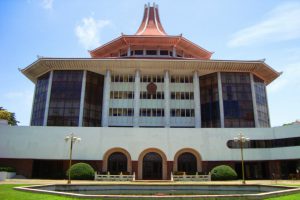“Rule of Law dictates that every act that is not sanctioned by the law and every act that violates the law be struck down as illegal.”
Supreme Court of the Democratic Socialist Republic of Sri Lanka: A Seven-Judge Bench comprising of H.N.J. Perera, CJ and Buwaneka Aluwihare, Sisira J. De Abrew, Priyantha Jayawardena, Prasanna Jayawardena, Vijith K. Malalgoda and Murdu N. B. Fernando, JJ. hearing a batch of fundamental right applications, unanimously held President Maithripala Sirisena’s November 2018 decision to the Parliament and hold snap elections as unconstitutional, thus ending a seven-week long constitutional crisis.
The island nation had been reeling under political crisis which began on October 26, 2018, when President Sirisena fired Prime Minister Ranil Wickremesinghe and replaced him with Mahinda Rajapaksa, a controversial former President accused of committing serious war crimes. However, when Rajapaksa could not muster a majority in Parliament, Sirisena sacked the legislature two years ahead of schedule.
In the instant petition, Petitioner, a member of the Parliament, prayed for a declaration that President Sirisena’s proclamation dated 09-11-2018 suspending the Parliament infringed his fundamental rights under Article 12(1) of the Constitution of Sri Lanka. It was contended that the said action was ex facie unlawful and in violation of Article 70 (1) of the Constitution as per which the President expressly prohibited from dissolving Parliament until the expiration of a period not less than four years and six months from the date appointed for its first meeting.
The respondent raised an objection as to the jurisdiction of Court to hear the petitions on the ground that the petitioners had not followed the specific procedure to challenge the abuse of powers by the President, viz., impeachment. The said objection was dismissed for being logically flawed as in view of dissolution, no Parliament existed in which a motion for impeachment could have been brought.
The argument regarding immunity to President’s action was dismissed stating that “the submission that…..President, in his capacity as the Head of State, has a species of inherent unrestricted omnipotent power which is akin to royal prerogative power held by a monarch, has to be emphatically rejected.”
The Court held that President’s power of summoning, proroguing and dissolving Parliament referred to in Article 33(2)(c) of the Constitution could be exercised only in conformity with Article 70 of the Constitution. Article 70 clearly stipulated that the President shall not dissolve Parliament during the first four and a half years from the date of its first meeting unless he is requested to do so by a resolution passed by not less than two-thirds of the members of Parliament.
In view of the above, it was held that the impugned proclamation had been issued outside legal limits and violated petitioner’s rights, both in his capacity as a parliamentarian and in the capacity of a citizen. As such, the proclamation was quashed and declared void ab initio.[Rajavarothiam Sampanthan v. Attorney General, 2018 SCC OnLine SL SC 74, decided on 13-12-2018]

